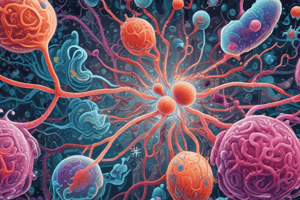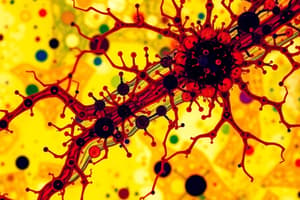Podcast
Questions and Answers
Who is credited with inventing the first compound microscope?
Who is credited with inventing the first compound microscope?
- Antonie van Leeuwenhoek
- Zacharias Janssen (correct)
- Louis Pasteur
- Robert Koch
What was the key contribution of Louis Pasteur to the germ theory of disease?
What was the key contribution of Louis Pasteur to the germ theory of disease?
- Development of vaccination (correct)
- Discovery of bacteria
- Observation of fermentation and spoilage
- Proposal of 'contagion' as a cause of disease
Who developed Koch's postulates to identify microorganisms as causes of disease?
Who developed Koch's postulates to identify microorganisms as causes of disease?
- Louis Pasteur
- Emil von Behring
- Robert Koch (correct)
- Antonie van Leeuwenhoek
What was the key discovery made by Dimitri Ivanovsky and Martinus Beijerinck?
What was the key discovery made by Dimitri Ivanovsky and Martinus Beijerinck?
Who developed recombinant DNA technology?
Who developed recombinant DNA technology?
What was the contribution of Elie Metchnikoff and Karl Landsteiner to microbiology?
What was the contribution of Elie Metchnikoff and Karl Landsteiner to microbiology?
Who discovered bacteria, yeast, and protists using a hand-held microscope?
Who discovered bacteria, yeast, and protists using a hand-held microscope?
What period is referred to as the 'Golden Age of Microbiology'?
What period is referred to as the 'Golden Age of Microbiology'?
Flashcards are hidden until you start studying
Study Notes
Ancient Civilizations (3000 BCE - 500 CE)
- Early observations of microorganisms:
- Ancient Egyptians (3000 BCE): observed fermentation and spoilage
- Ancient Greeks (500 BCE): Aristotle and Hippocrates described "bad air" and "miasma" as causes of disease
- Ancient Romans (100 BCE): observed fermentation and proposed "contagion" as a cause of disease
Microscope Development (1590 - 1676)
- Key figures:
- Zacharias Janssen (1590): invented the first compound microscope
- Antonie van Leeuwenhoek (1676): discovered bacteria, yeast, and protists using a hand-held microscope
Germ Theory (1676 - 1881)
- Key figures:
- Antonie van Leeuwenhoek (1676): observed microorganisms in water and proposed they caused disease
- Louis Pasteur (1857): developed the germ theory of disease and introduced vaccination
- Robert Koch (1881): developed Koch's postulates to identify microorganisms as causes of disease
Golden Age of Microbiology (1881 - 1914)
- Key discoveries:
- Isolation of bacteria: Robert Koch (1881) and Louis Pasteur (1881)
- Discovery of viruses: Dimitri Ivanovsky (1892) and Martinus Beijerinck (1898)
- Development of serology: Emil von Behring (1890) and Shibasaburo Kitasato (1890)
Modern Era (1914 - present)
- Key developments:
- Antibiotics: Alexander Fleming (1928) and Ernst Boris Chain (1941)
- Molecular biology: James Watson and Francis Crick (1953)
- Recombinant DNA technology: Stanley Cohen and Herbert Boyer (1973)
- Genomics and proteomics: late 20th century
Other Key Figures and Contributions
- Microbial ecology: Sergei Winogradsky (1850s) and Martinus Beijerinck (1900s)
- Virology: Wendell Stanley (1930s) and Frank Macfarlane Burnet (1940s)
- Immunology: Elie Metchnikoff (1890s) and Karl Landsteiner (1900s)
Ancient Civilizations (3000 BCE - 500 CE)
- Ancient Egyptians observed fermentation and spoilage around 3000 BCE
- Ancient Greeks, Aristotle and Hippocrates, described "bad air" and "miasma" as causes of disease around 500 BCE
- Ancient Romans observed fermentation and proposed "contagion" as a cause of disease around 100 BCE
Microscope Development (1590 - 1676)
- Zacharias Janssen invented the first compound microscope in 1590
- Antonie van Leeuwenhoek discovered bacteria, yeast, and protists using a hand-held microscope in 1676
Germ Theory (1676 - 1881)
- Antonie van Leeuwenhoek proposed that microorganisms caused disease in 1676
- Louis Pasteur developed the germ theory of disease and introduced vaccination in 1857
- Robert Koch developed Koch's postulates to identify microorganisms as causes of disease in 1881
Golden Age of Microbiology (1881 - 1914)
- Robert Koch and Louis Pasteur isolated bacteria in 1881
- Dimitri Ivanovsky and Martinus Beijerinck discovered viruses in 1892 and 1898
- Emil von Behring and Shibasaburo Kitasato developed serology in 1890
Modern Era (1914 - present)
- Alexander Fleming discovered antibiotics in 1928
- Ernst Boris Chain developed antibiotics in 1941
- James Watson and Francis Crick discovered molecular biology in 1953
- Stanley Cohen and Herbert Boyer developed recombinant DNA technology in 1973
- Genomics and proteomics emerged in the late 20th century
Other Key Figures and Contributions
- Sergei Winogradsky and Martinus Beijerinck contributed to microbial ecology in the 1850s and 1900s
- Wendell Stanley and Frank Macfarlane Burnet contributed to virology in the 1930s and 1940s
- Elie Metchnikoff and Karl Landsteiner contributed to immunology in the 1890s and 1900s
Studying That Suits You
Use AI to generate personalized quizzes and flashcards to suit your learning preferences.




